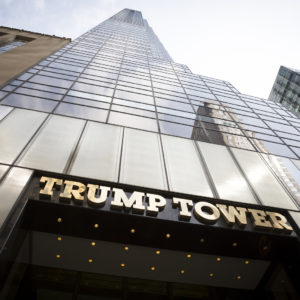Will he rise to the office of president, or will he become some sort of mad uncle hidden away in one of his properties, railing against the media on Twitter? The Donald Trump presidency is in the balance even before it has begun.
Nonetheless, there will be a government, and there will be a devolution of power to the many offices of government. For that to work smoothly, President-elect Trump needs to show he can manage as well as deride by tweet. Didn’t he have a Cabinet list of some sort at the back of his mind? Transition is a president’s first test.
Those who voted for Trump — for a new broom, for an end to government by elites — aren’t seeing a new dawn, but rather a chaotic search among the retreads and by a search team that itself is fractured. A little amateurism is refreshing, a lot clownish.
Some of the confusion was anticipated. It’s hard for an outsider to take over the complex structure of the government. The answer should’ve been for Trump to reach out to people who know Washington, people who have substantial contact lists, people who could guide him unobtrusively and skillfully.
Trump needs a graybeard.
Washington’s graybeards have been the savior of many in crisis. Mostly they are lawyers, like the late Robert Strauss and the late Clark Clifford. They are operatives who slide in and out of the White House or wherever, guiding, advising and suggesting. All great presidents have used them.
Ronald Reagan sought out Howard Baker to be his chief of staff and counselor when his administration was in trouble over Irangate. He was an exception in that he was already a commanding figure as the Republican leader in the Senate. He saved Reagan. Baker went into the White House as chief of staff, but the classical graybeard is a counselor who doesn’t want office himself or herself.
Probably Trump would be best served by having a former governor at his elbow, defending the new president from the agenda-driven office-seekers. New Jersey Gov. Chris Christie came close, but his own thirst for office most likely clouded his full usefulness to Trump.
Christie, along with Mike Pence, could’ve sorted through the large and permanent rump of those who have Potomac Fever: a passionate desire to be in government or back in government. It rages in the think tanks and the political science departments of universities. They, the feverish, wait for the call. Someone needs to know the competent, even the great, from the purely ambitious.
Who the president-elect picks now determines the success of the first 100 days of the president. And ever since FDR, presidents are judged on the first 100 days: days in which Trump has promised much, from starting on the “beautiful wall” to repealing Obamacare.
So far, all the names mentioned in the speculation have also been office-seekers. Two have had their dreams come true: Reince Priebus and Steve Bannon, someone who would quickly fill any vacuums with his own acolytes, ready to push the agenda of the alt-right — a nice way of saying “fringe.”
It is reasonable to expect the Trump administration to move to the right. But it is less reasonable to see it move from leaning right to veering wildly into the dogma and policies that are outside of public tolerance. In short, leaning toward Reagan is fine; toward George Wallace is not. Leaning toward George W. Bush is OK.
There are broad but accepted parameters in which America will accept the ideology of its president.
The president has limited ability to act domestically; and to achieve any of his declared aims is going to take patience as well as compromise. That takes the suavity of a graybeard consigliere, something missing at present.
If Trump doesn’t get a grip on his transition, he’ll guarantee a wounded administration from the start.
He needs someone who can guide him without seeking office for his or herself. A call to former Mississippi Gov. Haley Barbour might be a good start.
The situation is dire. The tweet stops here.

